
Welcome

EazyCNC
jDraft 2.0



PureJavaComm

PIC CDC ACM

Weather

Ten-Buck Furnace

H8S Bootloader

Camera Calibration

Multitouch

Myford VFD

Fun with HC08

bl08

printf II

Java Goes Native

Densitometer

printf
jApp

Igloo

New Furnace

New Furnace
Part II

Linux 101

H8S/gcc

Quickie

Gas Fired Furnace

Down Memory Lane

Exlibris

Wheel Patterns

Glitches

CHIP-8

eDice

Animato
jDraft

JNA Benchmark

Contact Info
18-Sep-2010
The Ten Bucks One Hour Furnace
Previously I've reported about my Gas Fired Furnace that was very successful and about the slightly larger New Furnace (don't miss the sequel New Furnace - Part II ).While the New Furnace was successful and functional, it has a few drawbacks. It is large-ish because I dimensioned it to accomodate 2.7 litre crucible, which is nice if you need 20 kg of liquid iron and have a pal to help lift it, but it also means it takes longer to reach the melting temperature and it uses a lot of gas. It also takes more storage space and it is a bit of a chore to set everything up for a casting session. Also the insulation leaves something to be desired as the refractory material selected was selected for its ability to stand the +1500 Celsius temperature required for iron, not for its insulation capabilities, so a lot of the heat is wasted.
All this means that I'm not that keen to use the furnace for small jobs which is a bit of a shame.
So I've been musing on how to improve the situation, and one day while surfing the web something sparked an idea: how about Siporex?!
Siporex is a Swedish invention and is basically foamy concrete. It is suprisingly light, the density is about half that of water, so it's actually concrete that floats!
Siporex is easy to shape and work with hand tools.
It has great insulation properties, the thermal conductivity is 0.144 W/m deg C compared to high density refractor materials, as used in my previous furnaces, which have a K factor in the ball park of 1.2 - 1.4 W/m deg C. So the insulation characteristics are almost ten times better!
Siporex has a melting point of almost 1600 Celsius (2900 Fahrenheit), so using it for a furnace to melt brass and gun metal at around 1000 C (1800F) should be possible.
And best of all, it is cheap and readily available at hardware stores that stock building materials.
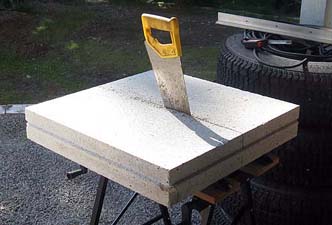
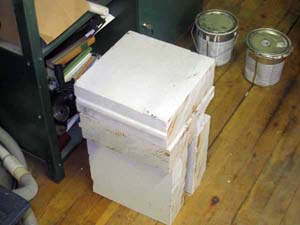 So on the way home I purchased a block of Siporex about 600 x 600 x 100 mm3 (that's 2' x 2' x 4" for the imperialists ;-).
So on the way home I purchased a block of Siporex about 600 x 600 x 100 mm3 (that's 2' x 2' x 4" for the imperialists ;-).
That set me back 9.90 EUR if I recall correctly.
On the left you can see how a regular wood saw was used to cut it into four pieces.
The siporex blocks are about one foot square (actually 280 mm) and weigh about 10 lbs or 4.5 kg each, so they are easy to move and store away. My plan was not to build any furnace per se but to use the blocks as a self supporting structure.
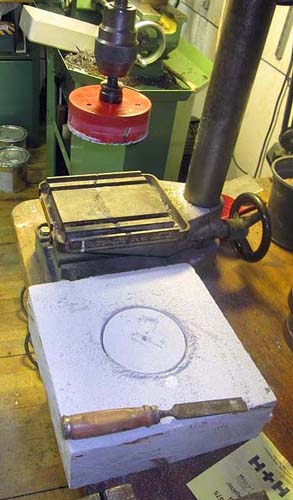 |
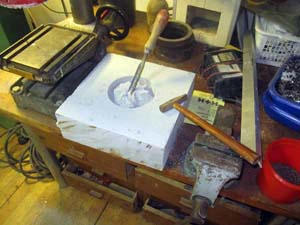 |
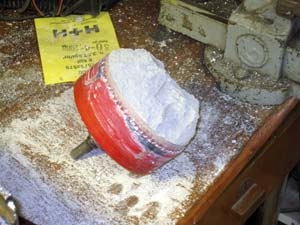 |
I made a cut as deep as possible with a 150 mm/6" hole saw in the drill press from both sides of the block.
Two of these blocks were required. The bore was completed with a wood chisel and hammer. And a knife was applied to tidy it all up.
The knife, chisel and hammer came in handy in un-clogging the hole saw too!
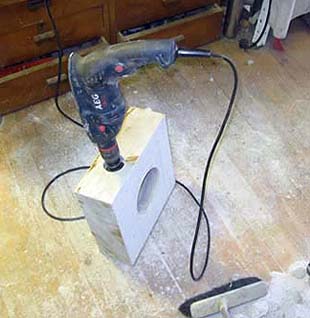
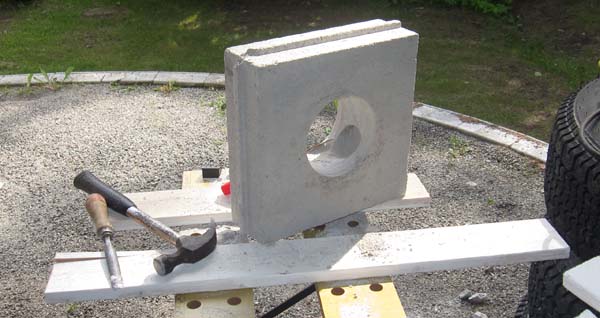 One of the blocks with the big aperture received also a tangential hole created with a smaller hole saw
using hand drill. This hole serves as the burner inlet.
One of the blocks with the big aperture received also a tangential hole created with a smaller hole saw
using hand drill. This hole serves as the burner inlet.
The same saw was used to cut an exhaust hole on the center of one of the blocks.
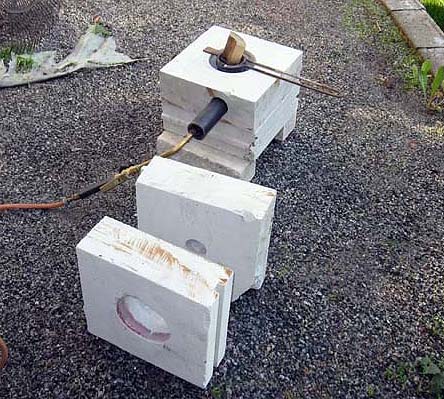 Here you see the furnace partially assembled.
Here you see the furnace partially assembled.
There is a block with no holes at the bottom and on top of that the block with the burner inlet.
Inside the hole you see the crucible, welded from steel, charged with scrap gun metal. Note how the handle will protrude between the siporex blocks when the furnace is assembled, this will cause some heat to leak. This could be easily fixed by cutting some grooves for the handle bars.
In front of the furnace you see, nearest to the camera, the next furnace body block with the other larger hole in it which allows for a higher crucible or protruding charge, and behind that the lid or top part which has only a small orifice to vent the exhaust, but keep most of the heat in.
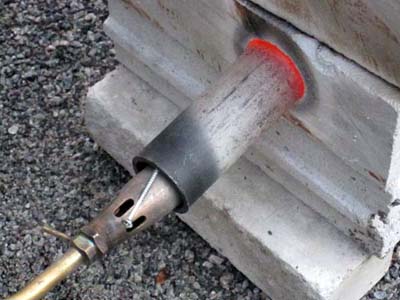 Here you see the furnace in action fired with a standard rather small (about 1 1/4" / 30 mm) Sievert
burner with a 1.5 bar gas regulator.
Here you see the furnace in action fired with a standard rather small (about 1 1/4" / 30 mm) Sievert
burner with a 1.5 bar gas regulator.
I've inserted a piece of black iron pipe to get the brass burner a little bit further away from the hot internals of the furnace. The draft that the venturi effect draws around the burner also helps to prevent the burner from melting!
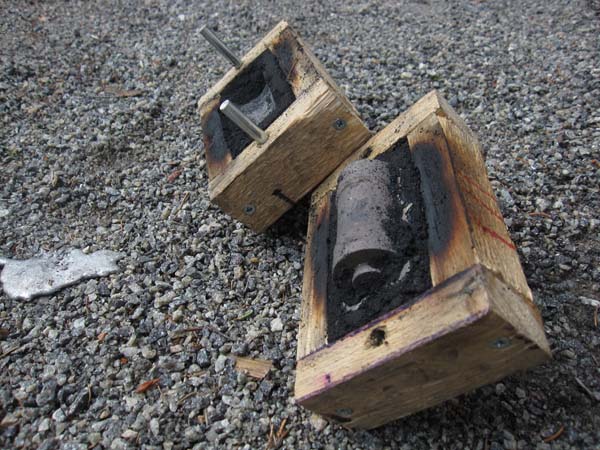 And here is my very first bronze casting: a cylinder block for my Stephenson Rocket Engine!
And here is my very first bronze casting: a cylinder block for my Stephenson Rocket Engine!
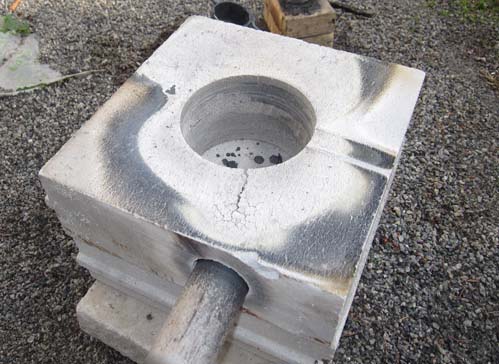 After a few firings the siporex around the inlet crumbles a bit. But hey, that is no problem, it will be only a few euros and a quarter of an hour to replace that part of the furnace when the time comes!
After a few firings the siporex around the inlet crumbles a bit. But hey, that is no problem, it will be only a few euros and a quarter of an hour to replace that part of the furnace when the time comes!
In conclusion, I'm pretty happy with this furnace. It can be set up and fired in five minutes and stored away even faster on a shelf afterwards. It melts a pint of brass in fifteen minutes flat.
So now if the inspirations strikes me I can make a flywheel casting within an hour!
Heck! It took me longer to create this web page.
That's all folks.
br Kusti
PS
I was tempted to call this page Quickie but that joke has whiskers on it I'm afraid!